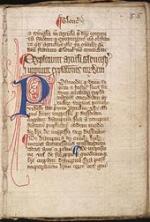13. And the city of London shall have all it ancient liberties and free customs, as well by land as by water; furthermore, we decree and grant that all other cities, boroughs, towns, and ports shall have all their liberties and free customs.
14. And for obtaining the common counsel of the kingdom anent the assessing of an aid (except in the three cases aforesaid) or of a scutage, we will cause to be summoned the archbishops, bishops, abbots, earls, and greater barons, severally by our letters; and we will moveover cause to be summoned generally, through our sheriffs and bailiffs, and others who hold of us in chief, for a fixed date, namely, after the expiry of at least forty days, and at a fixed place; and in all letters of such summons we will specify the reason of the summons. And when the summons has thus been made, the business shall proceed on the day appointed, according to the counsel of such as are present, although not all who were summoned have come.
15. We will not for the future grant to anyone license to take an aid from his own free tenants, except to ransom his person, to make his eldest son a knight, and once to marry his eldest daughter; and on each of these occasions there shall be levied only a reasonable aid.
16. No one shall be distrained for performance of greater service for a knight’s fee, or for any other free tenement, than is due therefrom.
17. Common pleas shall not follow our court, but shall be held in some fixed place.
18. Inquests of novel disseisin, of mort d’ancestor, and of darrein presentment shall not be held elsewhere than in their own county courts, and that in manner following; We, or, if we should be out of the realm, our chief justiciar, will send two justiciaries through every county four times a year, who shall alone with four knights of the county chosen by the county, hold the said assizes in the county court, on the day and in the place of meeting of that court.
19. And if any of the said assizes cannot be taken on the day of the county court, let there remain of the knights and freeholders, who were present at the county court on that day, as many as may be required for the efficient making of judgments, according as the business be more or less.
20. A freeman shall not be amerced for a slight offense, except in accordance with the degree of the offense; and for a grave offense he shall be amerced in accordance with the gravity of the offense, yet saving always his “contentment”; and a merchant in the same way, saving his “merchandise”; and a villein shall be amerced in the same way, saving his “wainage” if they have fallen into our mercy: and none of the aforesaid amercements shall be imposed except by the oath of honest men of the neighborhood.
21. Earls and barons shall not be amerced except through their peers, and only in accordance with the degree of the offense.
22. A clerk shall not be amerced in respect of his lay holding except after the manner of the others aforesaid; further, he shall not be amerced in accordance with the extent of his ecclesiastical benefice.




